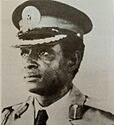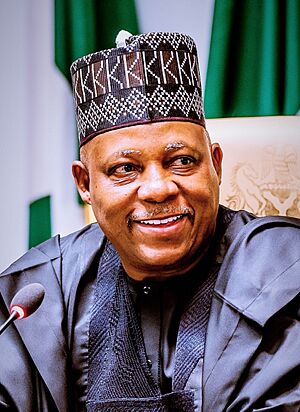Vice President of Nigeria facts for kids
Quick facts for kids Vice President of theFederal Republic of Nigeria |
|
|---|---|

|
|
|
|
| Style | |
| Abbreviation | V-POFRON |
| Member of | Federal Executive Council National Economic Council National Security Council |
| Residence | Akinola Aguda House |
| Seat | Abuja, F.C.T. |
| Nominator | Presidential candidate |
| Appointer | Direct popular election or, if vacant, President via National Assembly confirmation |
| Term length | Four years, renewable once |
| Constituting instrument | Constitution of Nigeria |
| Inaugural holder | Babafemi Ogundipe (Military) Alex Ifeanyichukwu Ekwueme (Elected) |
| Formation | 16 January 1966 |
| Succession | First |
| Salary | ₦12,126,000 annually |
The Vice President of Nigeria is a very important person in the Nigerian government. They are the second-highest official in the part of the government that carries out laws, right after the president of Nigeria. If something happens to the president, the vice president is the first person in line to take over.
The official title is Vice President of the Federal Republic of Nigeria. People vote for the vice president at the same time they vote for the president. They both serve for four years and can be re-elected once.
Kashim Shettima is the 15th and current vice president of Nigeria. He started his job on May 29, 2023.
Contents
Who Can Be Vice President?
To become the Vice President of Nigeria, a person must meet a few requirements:
- They must be a citizen of Nigeria by birth.
- They must be at least 40 years old.
- They must belong to a political party.
- Their political party must officially support them as a candidate.
The Vice President's Promise
Before starting their job, the Vice President of Nigeria must make a special promise called an oath of office. This promise is written in the Constitution of Nigeria, which is Nigeria's most important rulebook.
The oath is given by the Chief Justice of the Supreme Court of Nigeria, who is the highest judge in the country. Other important government officials, like state governors' deputies and government ministers, also say a similar oath.
This promise makes sure the Vice President will do their job well and always work for the good of Nigeria. It also means they will follow the Constitution and not let their personal feelings affect their decisions.
I, do solemnly swear/affirm that I will be faithful and bear true allegiance to the Federal Republic of Nigeria; that as Vice-President of the Federal Republic of Nigeria, I will discharge my duties to the best of my ability, faithfully and in accordance with the Constitution of the Federal Republic of Nigeria and the law, and always in the interest of the sovereignty, integrity, solidarity, well-being and prosperity of the Federal Republic of Nigeria; that I will strive to preserve the Fundamental Objectives and Directive Principles of State Policy contained in the Constitution of the Federal Republic of Nigeria; that I will not allow my personal interest to influence my official conduct or my official decisions, that I will to the best of my ability preserve, protect and defend the Constitution of the Federal Republic of Nigeria; that I will abide by the Code of Conduct contained in the Fifth Schedule to the Constitution of the Federal Republic of Nigeria; that in all circumstances, I will do right to all manner of people, according to law, without fear or favour, affection or ill-will; that I will not directly or indirectly communicate or reveal to any person any matter which shall be brought under my consideration or shall become known to me as Vice-President of the Federal Republic of Nigeria. So help me God.
What Does the Vice President Do?
The Vice President of Nigeria has several important jobs:
- They attend all cabinet meetings, which are meetings with the President and other top government officials.
- They are a member of the National Security Council, which deals with the country's safety.
- They are also part of the Federal Executive Council.
- They lead the National Economic Council, which helps plan Nigeria's economy.
The amount of power the Vice President has often depends on what duties the President gives them. The Vice President cannot make big decisions or issue orders without the President's approval. This is because the President holds all the main executive powers.
If the President cannot do their job for any reason, the Vice President steps in as the acting president. If the President resigns, is removed from office, or passes away, the Vice President becomes the new President of Nigeria.
List of Vice Presidents
Military Government (1966–1979)
During this time, Nigeria was ruled by the military. The person in the role of Vice President was called the Chief of Staff, Supreme Headquarters.
Major Chukwuma Kaduna Nzeogwu led a military takeover in 1966. This event ended the First Nigerian Republic and created the office of Vice President. Babafemi Ogundipe was the first person to hold this position.
| Chief of Staff | Term of office | Military | Head of State | ||||
|---|---|---|---|---|---|---|---|
| No. | Portrait | Name (birth–death) |
Took office | Left office | Time in office | ||
| 1 | Brigadier Babafemi Ogundipe (1924–1971) |
16 January 1966 | 29 July 1966 (Removed from office.) |
194 days | Central Military Government | Major General Johnson Aguiyi-Ironsi | |
| 2 | Vice Admiral Joseph Edet Akinwale Wey (1918–1991) |
1 August 1966 | 29 July 1975 (Removed from office.) |
8 years, 362 days | Federal Military Government | General Yakubu Gowon | |
| 3 |  |
Lieutenant General Olusegun Obasanjo (born 1937) |
29 July 1975 | 13 February 1976 (Became Head of State after the President was killed.) |
199 days | General Murtala Muhammed | |
| 4 |  |
Major General Shehu Musa Yar'Adua (1943–1997) |
13 February 1976 | 30 September 1979 (Handed power to a civilian government.) |
3 years, 229 days | General Olusegun Obasanjo | |
Second Republic (1979–1983)
Under Nigeria's 1979 Constitution, the President was both the head of the country and the head of the government. The President and the Vice President were elected for four-year terms. If the President's position became empty, the Vice President would become the acting president.
| Vice President | Term of office | Political party | Elected | President | ||||
|---|---|---|---|---|---|---|---|---|
| No. | Portrait | Name (birth–death) |
Took office | Left office | Time in office | |||
| 5 |  |
Alex Ifeanyichukwu Ekwueme (1932–2017) |
1 October 1979 | 31 December 1983 (Removed from office by a military takeover.) |
4 years, 91 days | National Party of Nigeria | 1979 1983 |
Alhaji Shehu Shagari |
Military Government (1983–1993)
Major-General Muhammadu Buhari became the military head of state after a military takeover in 1983. Major General Tunde Idiagbon then became the Chief of Staff, Supreme Headquarters.
| Chief of Staff/ Vice President |
Term of office | Military | Head of State/ President |
||||
|---|---|---|---|---|---|---|---|
| No. | Portrait | Name (birth–death) |
Took office | Left office | Time in office | ||
| 6 | Major General Tunde Idiagbon (1943–1999) |
31 December 1983 | 27 August 1985 (Removed from office.) |
1 year, 239 days | Supreme Military Council | Major General Muhammadu Buhari | |
| 7 | Commodore Ebitu Ukiwe (born 1940) |
27 August 1985 | October 1986 (Resigned.) |
1 year, 35 days | Armed Forces Ruling Council | General Ibrahim Babangida | |
| 8 | Admiral Augustus Aikhomu (1939–2011) |
October 1986 | 26 August 1993 (Handed power to an interim government.) |
6 years, 329 days | |||
Interim National Government (1993)
Chief Ernest Shonekan became the temporary head of Nigeria during a political crisis. He planned for Moshood Abiola to be his vice president, but Abiola refused, saying he should be the actual president.
| Vice President | Period | Head of State | ||
|---|---|---|---|---|
| Vacant | 26 August 1993 | 17 November 1993 | 83 days | Chief Ernest Shonekan |
Military Government (1993–1999)
General Sani Abacha led another military takeover in 1993, removing the temporary government. Lieutenant General Oladipo Diya became the Chief of General Staff during this period.
| Chief of General Staff | Term of office | Military | Head of State | ||||
|---|---|---|---|---|---|---|---|
| No. | Portrait | Name (birth–death) |
Took office | Left office | Time in office | ||
| 9 | Lieutenant General Donaldson Oladipo Diya (1944–2023) |
17 November 1993 | 21 December 1997 (Removed from office and arrested.) |
4 years, 34 days | Provisional Ruling Council | General Sani Abacha | |
| Vacant (170 days) |
|||||||
| 10 | Vice Admiral Michael Akhigbe (1946–2013) |
9 June 1998 | 29 May 1999 (Handed power to a civilian government.) |
354 days | Provisional Ruling Council | General Abdulsalami Abubakar | |
Fourth Republic (1999–Present)
Under Nigeria's current Constitution, the President is both the head of the country and the head of the government. The President and the Vice President are elected for a four-year term and can be re-elected once. If the President's position becomes empty, the Vice President becomes the acting president.
| Vice President | Term of office | Political party | Elected | President | ||||
|---|---|---|---|---|---|---|---|---|
| No. | Portrait | Name | Took office | Left office | Time in office | |||
| 11 |  |
Atiku Abubakar (born 1946) |
29 May 1999 | 29 May 2007 | 8 years, 0 days | People's Democratic Party | 1999 2003 |
Chief Olusegun Obasanjo |
| 12 |  |
Goodluck Ebele Jonathan (born 1957) |
29 May 2007 | 6 May 2010 (Became President after the President passed away.) |
2 years, 342 days | People's Democratic Party | 2007 | Alhaji Umaru Musa Yar'Adua |
| Vacant (13 days) |
Goodluck Jonathan | |||||||
| 13 |  |
Namadi Sambo (born 1954) |
19 May 2010 | 29 May 2015 | 5 years, 10 days | People's Democratic Party | 2011 | |
| 14 |  |
Yemi Osinbajo (born 1957) |
29 May 2015 | 29 May 2023 | 8 years, 0 days | All Progressives Congress | 2015 2019 |
Muhammadu Buhari |
| 15 |  |
Kashim Shettima (born 1966) |
29 May 2023 | Incumbent | 2 years, 268 days | All Progressives Congress | 2023 | Bola Tinubu |
Vice Presidents by Time in Office
This table shows how long each Vice President has served.
| Rank | Vice president | Political party | Total time in office | Reason for leaving office |
|---|---|---|---|---|
| 1 | Joseph Edet Akinwale Wey | Military | 8 years, 362 days | Removed from office |
| 2 | Atiku Abubakar | People's Democratic Party | 8 years, 0 days | Term ended |
| Yemi Osinbajo | All Progressives Congress | 8 years, 0 days | Term ended | |
| 4 | Augustus Aikhomu | Military | 6 years, 329 days | Resigned |
| 5 | Namadi Sambo | People's Democratic Party | 5 years, 10 days | Term ended |
| 6 | Alex Ifeanyichukwu Ekwueme | National Party of Nigeria | 4 years, 91 days | Removed from office |
| 7 | Donaldson Oladipo Diya | Military | 4 years, 34 days | Removed from office and arrested |
| 8 | Shehu Musa Yar'Adua | Military | 3 years, 229 days | Resigned |
| 9 | Goodluck Ebele Jonathan | People's Democratic Party | 2 years, 342 days | President passed away |
| 10 | Tunde Idiagbon | Military | 1 year, 239 days | Removed from office |
| 11 | Kashim Shettima | All Progressives Congress | 2 years, 268 days | In office |
| 12 | Ebitu Ukiwe | Military | 1 year, 35 days | Resigned |
| 13 | Michael Akhigbe | Military | 354 days | Resigned |
| 14 | Olusegun Obasanjo | Military | 199 days | President was killed |
| 15 | Babafemi Ogundipe | Military | 194 days | Removed from office |
Where the Vice President Lives
The Vice President of Nigeria lives at a place called Akinola Aguda House.
See also
 In Spanish: Vicepresidente de Nigeria para niños
In Spanish: Vicepresidente de Nigeria para niños
- List of governors and governors-general of Nigeria
- List of heads of state of Nigeria
- List of heads of government of Nigeria
 | Frances Mary Albrier |
 | Whitney Young |
 | Muhammad Ali |


